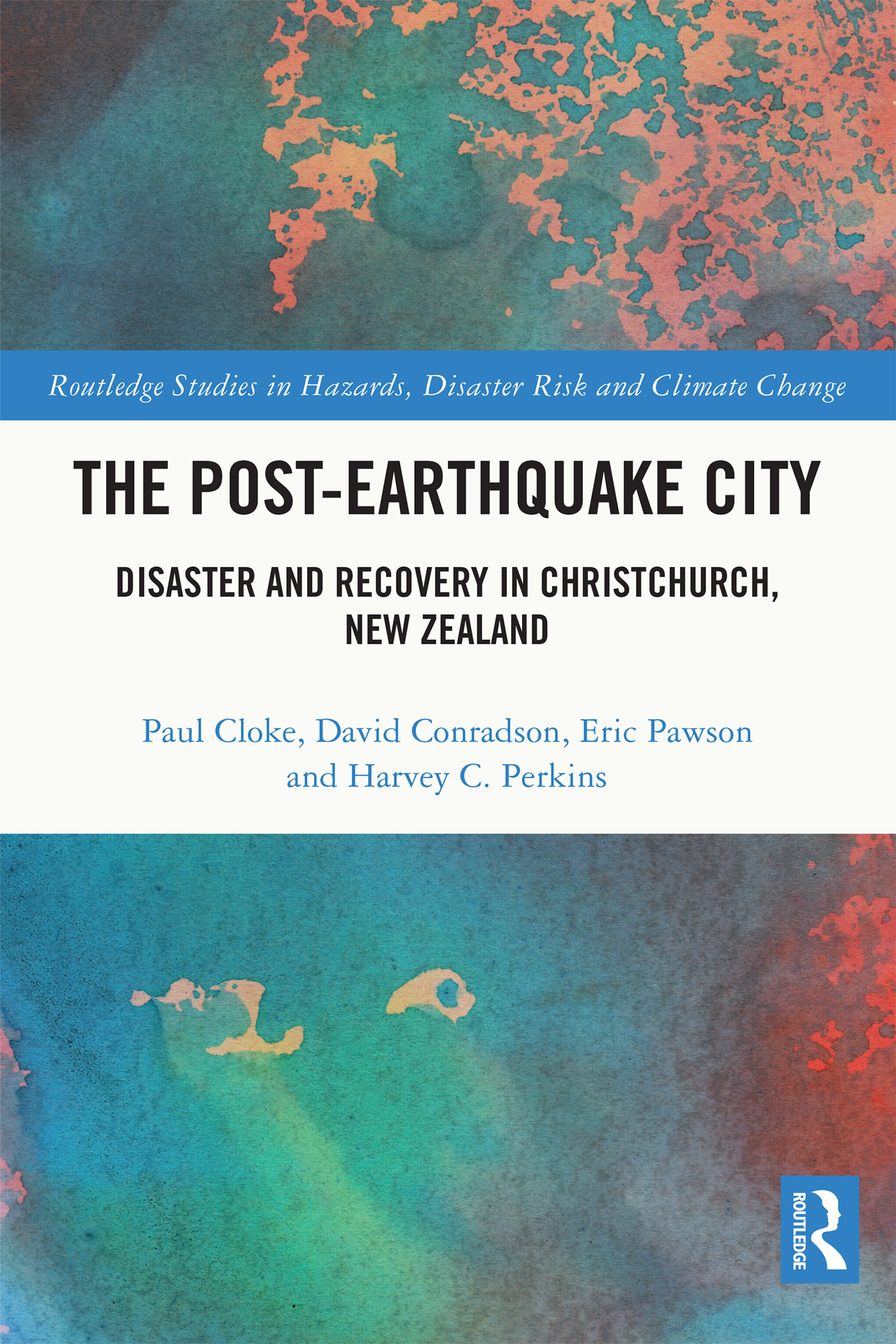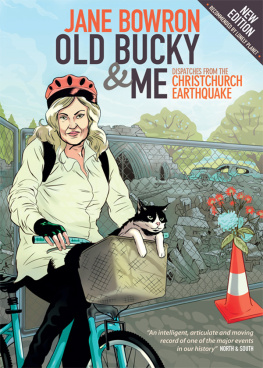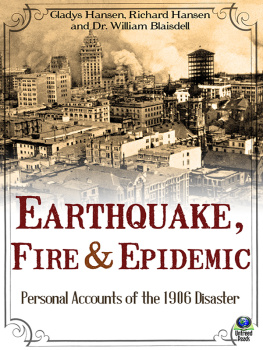
The Post-Earthquake City
This book critically assesses Christchurch, New Zealand as an evolving post-earthquake city. It examines the impact of the 201013 Canterbury earthquake sequence, employing a chronological structure to consider damage and displacement, recovery and renewal and the city in transition.
It offers a framework for understanding the multiple experiences and realities of post-earthquake recovery. It details how the rebuilding of the city has occurred and examines what has arisen in the context of an unprecedented opportunity to refashion land uses and social experience from the ground up. A recurring tension is observed between the desire and tendency of some to reproduce previous urban orthodoxies and the experimental efforts of others to fashion new cultures of progressive place-making and attention to the more-than-human city. The book offers several lessons for understanding disaster recovery in cities. It illuminates the opportunities disasters create for both the reassertion of the familiar and the emergence of the new; highlights the divergence of lived experience during recovery; and considers the extent to which a post-disaster city is prepared for likely climate futures.
The book will be valuable reading for critical disaster researchers as well as geographers, sociologists, urban planners and policy makers interested in disaster recovery.
Paul Cloke was Emeritus Professor of Human Geography, University of Exeter.
David Conradson is Professor of Human Geography, University of Canterbury.
Eric Pawson is Emeritus Professor of Geography, University of Canterbury.
Harvey C. Perkins is Emeritus Professor of Planning, University of Auckland.
Routledge Studies in Hazards, Disaster Risk and Climate Change
Series Editor: Ilan Kelman, Professor of Disasters and Health at the Institute for Risk and Disaster Reduction (IRDR) and the Institute for Global Health (IGH), University College London (UCL)
This series provides a forum for original and vibrant research. It offers contributions from each of these communities as well as innovative titles that examine the links between hazards, disasters and climate change, to bring these schools of thought closer together. This series promotes interdisciplinary scholarly work that is empirically and theoretically informed, with titles reflecting the wealth of research being undertaken in these diverse and exciting fields.
Empowerment and Social Justice in the Wake of Disasters
Occupy Sandy in Rockaway after Hurricane Sandy, USA
Sara Bondesson
Climate Change and Risk in South and Southeast Asia
Sociopolitical Perspectives
Edited by Devendraraj Madhanagopal and Salim Momtaz
Gender-Based Violence and Layered Disasters
Place, Culture and Survival
Nahid Rezwana and Rachel Pain
The Post-Earthquake City
Disaster and Recovery in Christchurch, New Zealand
Paul Cloke, David Conradson, Eric Pawson and Harvey C. Perkins
Local Adaptation to Climate Change in South India
Challenges and the Future in the Tsunami-hit Coastal Regions
Devendraraj Madhanagopal
For more information about this series, please visit: https://www.routledge.com/Routledge-Studies-in-Hazards-Disaster-Risk-and-Climate-Change/book-series/HDC
The Post-Earthquake City Disaster and Recovery in Christchurch, New Zealand
Paul Cloke, David Conradson, Eric Pawson and Harvey C. Perkins

First published 2023
by Routledge
4 Park Square, Milton Park, Abingdon, Oxon OX14 4RN
and by Routledge
605 Third Avenue, New York, NY 10158
Routledge is an imprint of the Taylor & Francis Group, an informa business
2023 Paul Cloke, David Conradson, Eric Pawson and Harvey C. Perkins
The right of Paul Cloke, David Conradson, Eric Pawson and Harvey C. Perkins to be identified as authors of this work has been asserted in accordance with sections 77 and 78 of the Copyright, Designs and Patents Act 1988.
All rights reserved. No part of this book may be reprinted or reproduced or utilised in any form or by any electronic, mechanical, or other means, now known or hereafter invented, including photocopying and recording, or in any information storage or retrieval system, without permission in writing from the publishers.
Trademark notice: Product or corporate names may be trademarks or registered trademarks, and are used only for identification and explanation without intent to infringe.
British Library Cataloguing-in-Publication Data
A catalogue record for this book is available from the British Library
ISBN: 978-0-367-22552-0 (hbk)
ISBN: 978-1-032-43672-2 (pbk)
ISBN: 978-0-429-27556-2 (ebk)
DOI: 10.4324/9780429275562
Typeset in Times New Roman
by SPi Technologies India Pvt Ltd (Straive)
Figures
Tables
Preface
At the time, the Canterbury earthquakes garnered a lot of international media coverage, but as with all such disasters, wider interest quickly faded. One of the stranger things about this event, however, is that it grew into a series, having begun without warning in early September 2010 and continuing, not with a diminishing number of aftershocks as was predicted, but with renewed energy and damaging major shakes over a period of some years. The most destructive one was in late February 2011, and it generated one of the largest-ever claims on the international insurance industry, despite being of much lesser magnitude than many regular earthquakes elsewhere.
The Canterbury earthquake story is marked by such peculiarities, which in our view have long warranted both attention and explanation. But although there has been a lot of work on aspects of the events published in the periodical literature, official sources and the media, there has not before now been a coherently argued account from a social science perspective. A recent set of essays (Uekusa et al. 2022) is an exception and is valuable in recognising that the city of Christchurch at the centre of our story has become something of a talisman for the globally emerging experience of multi-hazards. The earthquakes have been followed by floods and fires, the mosque shootings of March 2019, which once again brought the attention of the worlds media, and most recently Covid-19. The Covid lockdowns have in turn cast doubt on some of the assumptions on which the post-earthquake rebuild has been based. Yet all along, those assumptions of government intervention and showcase projects have been complemented and countered by grassroots initiatives and transitional experiments. The shape and outcomes of the rebuild have therefore played out in unpredictable ways of a period of years.
This is one reason why we have waited more than a decade to produce this book, and why we have taken our time to engage with a still evolving process, and with each other as authors. We know Christchurch and Canterbury well, three as long-term residents who lived through the earthquake sequence, and the fourth as a regular visitor to the city over many years, both before and since the event. We provide outline biographies on page xiv and discuss our various positionalities in the first chapter.
We owe debts of gratitude to a large number of people, starting with Tim Nolan, our talented and ever patient cartographer. Amongst many who have helped, encouraged or influenced us are Thomas Blakie, Jacky Bowring, Jan Cameron, Kelli Campbell, Ikenna Chukwudumogu, Simon Dickinson, Kelly Dombroski, Erin Heine, Alan Latham, Deborah Levy, Robin Kearns, Rob Kerr, Simon Kingham, John McDonagh, Mike Mackay, Colin Meurk, Judi Miller, Garry Moore and members of the Tuesday Club, Laurence Murphy, Brent Nahkies, Hugh Nicholson, Mark Poskitt, Nick Taylor, Sarah Tucker and Alice Ann Wetzel. We also thank all those who agreed to be interviewed for our study and the Christchurch journalists whose comprehensive earthquake recovery reporting has been invaluable. We also acknowledge the individuals and agencies who have allowed us to reproduce images; they are attributed in the usual way in the captions to the figures within each chapter. All unattributed graphics or images have been sourced from within the author team.
Next page







